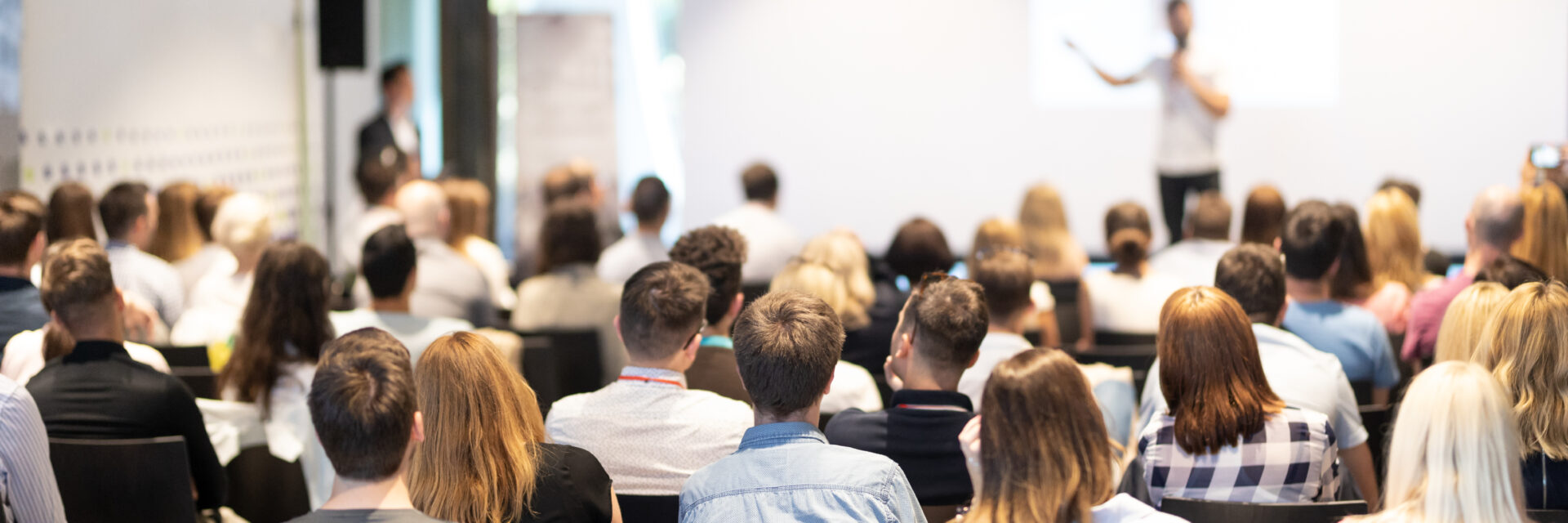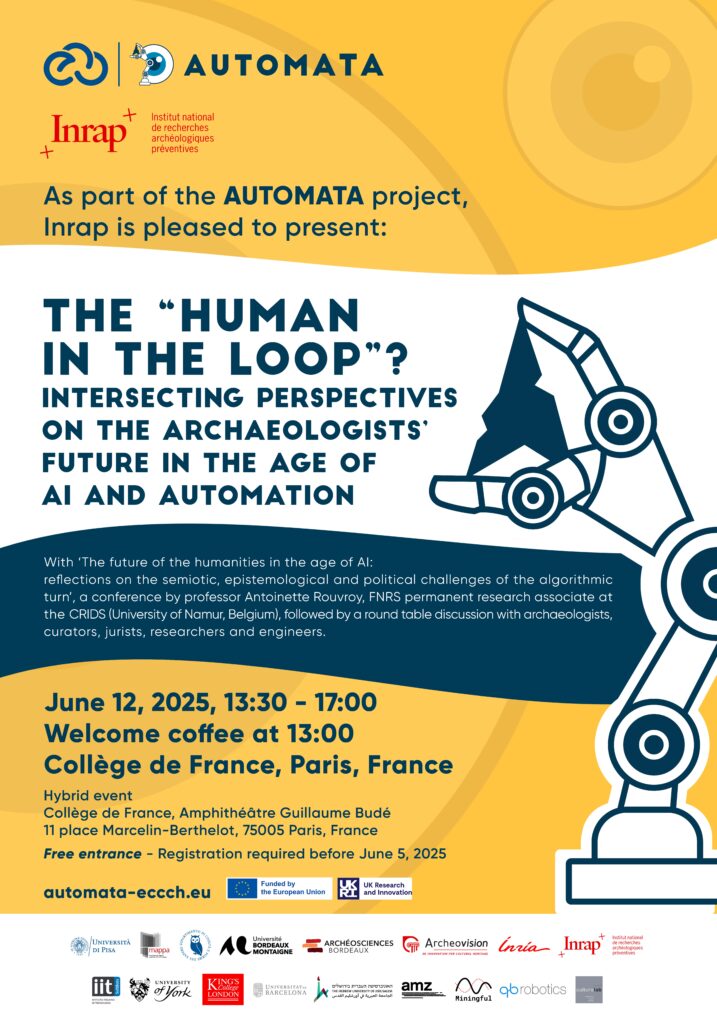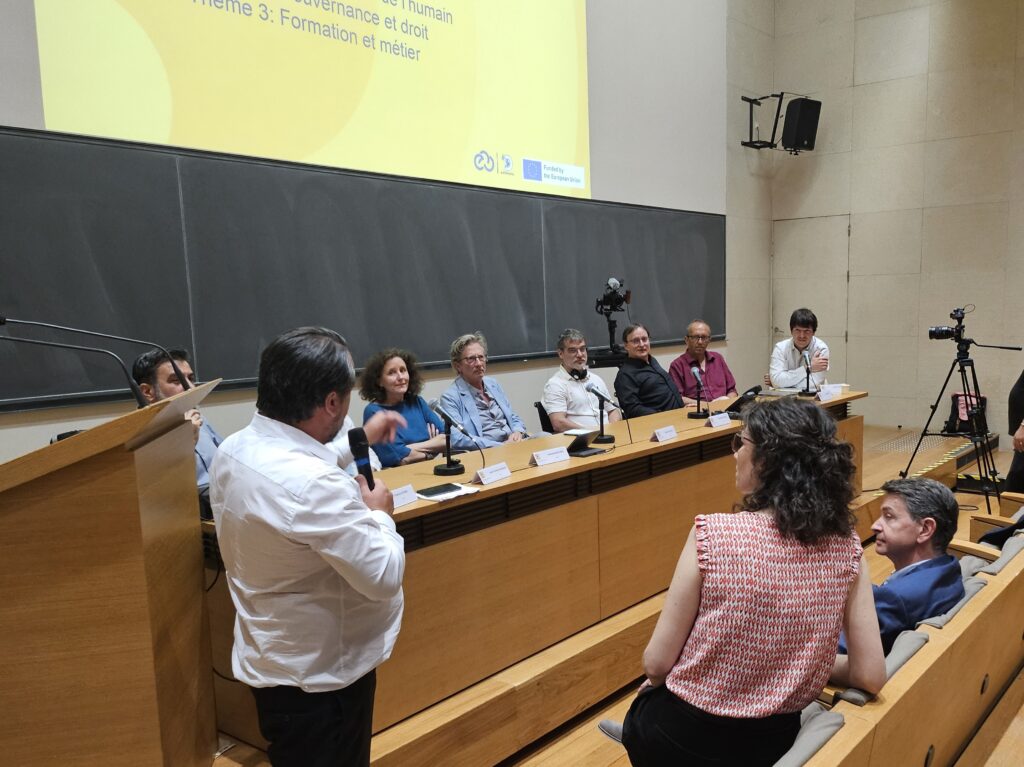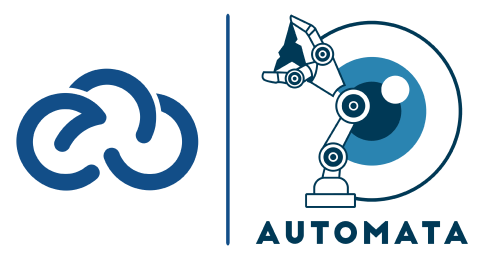
First Multiplier Event, Paris
What happens to the role of the archaeologist when AI takes over processing, analysis, and interpretation of data?
On June 12, INRAP organised in Paris the first AUTOMATA ‘Multiplier Event’ – halfway between a workshop and a conference – titled “The ‘human in the loop’? Intersecting perspectives on the archaeologists’ future in the age of AI and automation”. It gathered archaeologists, curators, jurists, engineers, philosophers and researchers to critically and openly discuss how the newest developments in artificial intelligence and automatisation are reshaping and will reshape archaeological practices.
Authors: Amala Marx, Kai Salas Rossenbach, Ariane Menu (INRAP)
The human in the loop?
The AUTOMATA project seeks to enhance the documentation of archaeological ceramics and lithics by using AI-augmented robotics and sensors to generate enriched 3D models. If these technologies promise efficiency, scale, and accessibility, they also raise critical questions about methodology, scientific integrity, and the evolving role of the archaeologist.

Behind this event’s title, the goal was to explore the concept of “artificialisation” in archaeology, and see how automated workflows to capture, process, analyse and create data impacted the field. To address this topic, a broad point of view was adopted, and speakers from various professions and countries – from the inside and the outside of AUTOMATA consortium – were invited to participate in this event:
- Marc Bouiron, scientific and technical director of Inrap, UMR 7264 CEPAM, France
- Emmanuelle Bryas, in charge of resources and documentary engineering at Inrap, France
- Rémy Chapoulie, professor of physics for archaeometry at Bordeaux Montaigne university and manager of the Archeovision platform, UMR 6034 Archéosciences Bordeaux, France
- Felipe Criado-Boado, research professor at the Consejo superior de investigaciones científicas, director of the Instituto de ciencias del patrimonio, Spain
- Gabriele Gattiglia, associate professor in archaeology at the Università di Pisa, AUTOMATA coordinator, MAPPA Lab, Italy
- Benjamin Jean, jurist and president founder of the Inno3 company, CRJ-CUERPI, France
- Colleen Morgan, senior lecturer in digital archaeology and heritage at the university of York, United Kingdom
- Théophane Nicolas, ceramologist at Inrap, deputy director of the UMR 8215 Trajectoires, France
- Federico Nurra, head of the digital research service at the Institut national d’histoire de l’art, France
- Xavier Rodier, director of the Maison des sciences de l’Homme Val de Loire, UMR 6173 CITERES, european project ECHOES coordinator, France
- Antoinette Rouvoy, FNRS permanent research associate at the CRIDS, University of Namur, Belgium
- Camille Salinesi, professor in computer science, co-director of the Observatoire de l’IA, Paris 1 Panthéon-Sorbonne university, UR 1445 CRI, France
- Gian Giuseppe Simeone, founder and executive manager of the Culture Lab agency, Belgium
- Anne-Violaine Szabados, research engineer at UMR 7041 ArScAn, consortium-HN pictorIA board member, France
- Huib Haye van der Werf, researcher, curator and art educator at Design Academy Eindhoven, Netherlands
Walking workshops in the streets of Paris

The morning of the event was dedicated to walking workshops. The speakers, divided into two groups, exchanged points of view and had reflective discussions through the Parisian streets and gardens. Moderated by Kai Salas Rossenbach (Deputy director for international affairs at Inrap, UMR 8096 ArchAm) and Amala Marx (International project manager and AUTOMATA coordinator for Inrap), these practical sessions fostered a dynamic and informal atmosphere to prepare the subsequent afternoon talks.
The discussions tackled three main topics for discussion, starting with knowledge creation and human role in IA and automated workflow, then the question of governance, law and scientific ethics in this new space were raised. Additionally, the necessity of reforming formation and training of archaeologists was discussed.
Inaugural lecture by professor Antoinette Rouvroy
The afternoon session, held at the Collège de France, hosted public presentations and discussions. After a welcoming word by Amala Marx, the public event was opened by the Inrap’s president, Dominique Garcia.

The inaugural lecture was delivered by professor Antoinette Rouvroy (FNRS-CRIDS[1], University of Namur), whose talk, “The future of the humanities in the age of AI: semiotic, epistemological and political challenges of the algorithmic turn”, provided a deep philosophical lens on automation.
Her conference underlined how algorithmic realism shifted boundaries to include data and digital signals, thus giving weight to what until then escaped representation, and how knowledge became statistical correlation.
Antoinette Rouvroy warned of three potential risks. She explained how the erasure of the temporal nuance of interpretation minimised information, creating an illusory “digital beauty” and normalising algorithmic decision-making, while the gaze was objectified and the result’s validity, overestimated through visual realism.
To resist this drift, the philosopher defended the category against the cluster, and urged to keep, beyond the human – who would always remain – the humanities within the algorithmic loop.
[1] Fonds de la recherche scientifique – Centre de recherche en information, droit et société (Belgian national fund for scientific research – research centre information, law and society).
First results of the AUTOMATA survey
The event was also the occasion for Ariane Menu (AUTOMATA assistant coordinator at Inrap) and Amala Marx to present the first results of the AUTOMATA survey launched earlier this year. Opened from March until May of 2025, it aimed to better understand the practices and perceptions of the archaeological community, and beyond, towards the technologies employed by the project: 3D modelling, non-destructive archaeometry, AI and robotics.
Read more on the AUTOMATA survey
Round tables

Moderated by Kai Salas Rossebach and Amala Marx, two round tables followed, bringing together the morning workshops’ participants and Antoinette Rouvroy to develop further on the prior discussions.
The speakers emphasised that AI should serve to assist, and not replace, human expertise. Dedicated training and formations are thus essential to enable archaeologists to critically engage with AI workflows. The participants also underlined how the development of ethical frameworks was necessary to guide responsible digitisation processes, including transparent data and decision-making procedures to demystify the “black box” effect of the algorithms.
As this study day demonstrated, such measures are essential to ensure that archaeologists remain active contributors to the knowledge production, rather than become passive observers of AI-generated data.
